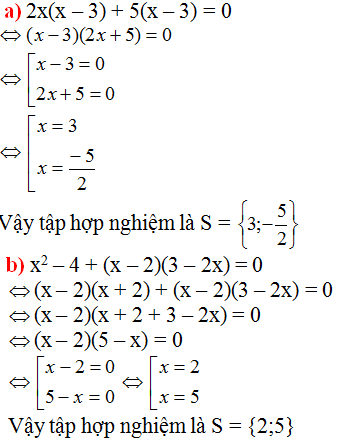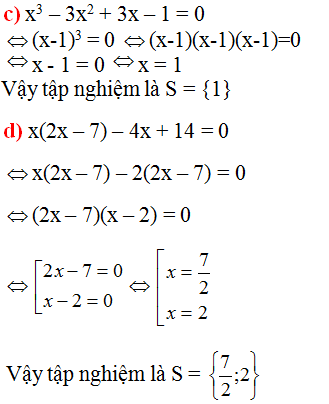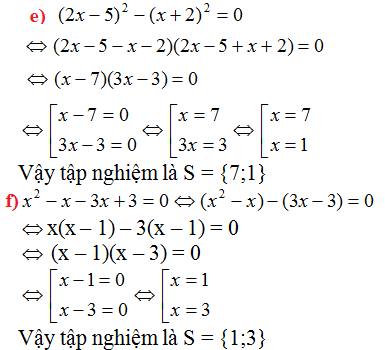Hãy nhập câu hỏi của bạn vào đây, nếu là tài khoản VIP, bạn sẽ được ưu tiên trả lời.

\(a,2x\left(x-3\right)+5\left(x-3\right)=0\)
\(\Leftrightarrow\left(2x+5\right)\left(x-3\right)=0\)
\(\Leftrightarrow\orbr{\begin{cases}2x+5=0\\x-3=0\end{cases}}\Leftrightarrow\orbr{\begin{cases}2x=-5\\x=3\end{cases}}\Leftrightarrow\orbr{\begin{cases}x=-\frac{5}{2}\\x=3\end{cases}}\)
Vậy .........
\(b,\left(x^2-4\right)+\left(x-2\right)\left(3-2x=0\right)\)
\(\Leftrightarrow x^2-4-2x^2+7x-6=0\)
\(\Leftrightarrow-x^2+7x-10=0\)
\(\Leftrightarrow-\left(x-5\right)\left(x-2\right)=0\)
\(\Leftrightarrow\orbr{\begin{cases}x=5\\x=2\end{cases}}\)
Vậy ..................
\(c,x^3-3x^2+3x-1=0\)
\(\Leftrightarrow\left(x-1\right)^3=0\)
\(\Leftrightarrow x=1\)
\(d,x\left(2x-7\right)-4x+14=0\)
\(\Leftrightarrow2x^2-7x-4x+14=0\)
\(\Leftrightarrow2x^2-11x+14=0\)
\(\Leftrightarrow\left(2x-7\right)\left(x-2\right)=0\)
\(\Leftrightarrow\orbr{\begin{cases}x=\frac{7}{2}\\x=2\end{cases}}\)
Vậy ............
\(e,\left(2x-5\right)^2-\left(x+2\right)^2=0\)
\(\Leftrightarrow4x^2-20x+25-x^2-4x-4=0\)
\(\Leftrightarrow3x^2-24x+21=0\)
\(\Leftrightarrow3\left(x-7\right)\left(x-1\right)=0\)
\(\Leftrightarrow\orbr{\begin{cases}x-7=0\\x-1=0\end{cases}}\Leftrightarrow\orbr{\begin{cases}x=7\\x=1\end{cases}}\)
Vậy .....................
\(f,x^2-x-\left(3x-3\right)=0\)
\(\Leftrightarrow x^2-x-3x+3=0\)
\(\Leftrightarrow x^2-4x+3=0\)
\(\Leftrightarrow\left(x-3\right)\left(x-1\right)=0\)
\(\Leftrightarrow\orbr{\begin{cases}x-3=0\\x-1=0\end{cases}}\Leftrightarrow\orbr{\begin{cases}x=3\\x=1\end{cases}}\)
Vậy ..............

a, (3x-1)2 - (x+3)2 = 0
<=> [(3x-1)-(x+3)][(3x-1)+(x+3)] = 0
<=> (3x-1-x-3)(3x-1+x+3) = 0
<=> (2x-4)(4x+2) = 0
=> 2x-4=0 hoặc 4x+2=0
=> 2x =4 hoặc 4x = -2
=> x = 2 hoặc x = \(\frac{-1}{2}\)
\(\begin{array}{l} a){\left( {3x - 1} \right)^2} - {\left( {x + 3} \right)^2} = 0\\ \Leftrightarrow \left( {3x - 1 + x + 3} \right)\left[ {3x - 1 - x - 3} \right] = 0\\ \Leftrightarrow \left( {4x + 2} \right)\left( {2x - 4} \right) = 0\\ \Leftrightarrow \left[ \begin{array}{l} 4x + 2 = 0\\ 2x - 4 = 0 \end{array} \right. \Leftrightarrow \left[ \begin{array}{l} x = - \dfrac{1}{2}\\ x = 2 \end{array} \right.\\ b){x^3} - \dfrac{x}{{49}} = 0\\ \Leftrightarrow 49{x^3} - x = 0\\ \Leftrightarrow x\left( {49{x^2} - 1} \right) = 0\\ \Leftrightarrow \left[ \begin{array}{l} x = 0\\ 49{x^2} - 1 = 0 \end{array} \right. \Leftrightarrow \left[ \begin{array}{l} x = 0\\ x = \pm \dfrac{1}{7} \end{array} \right.\\ c){x^2} - 7x + 12 = 0\\ \Leftrightarrow {x^2} - 3x - 4x + 12 = 0\\ \Leftrightarrow x\left( {x - 3} \right) - 4\left( {x - 3} \right) = 0\\ \Leftrightarrow \left( {x - 3} \right)\left( {x - 4} \right) = 0\\ \Leftrightarrow \left[ \begin{array}{l} x - 3 = 0\\ x - 4 = 0 \end{array} \right. \Leftrightarrow \left[ \begin{array}{l} x = 3\\ x = 4 \end{array} \right.\\ d)4{x^2} - 3x - 1 = 0\\ \Leftrightarrow 4{x^2} + x - 4x - 1 = 0\\ \Leftrightarrow x\left( {4x + 1} \right) - \left( {4x + 1} \right) = 0\\ \Leftrightarrow \left( {4x + 1} \right)\left( {x - 1} \right) = 0\\ \Leftrightarrow \left[ \begin{array}{l} 4x + 1 = 0\\ x - 1 = 0 \end{array} \right. \Leftrightarrow \left[ \begin{array}{l} x = - \dfrac{1}{4}\\ x = 1 \end{array} \right.\\ e){x^3} - 2x - 4 = 0\\ \Leftrightarrow {x^3} - 4x + 2x - 4 = 0\\ \Leftrightarrow x\left( {{x^2} - 4} \right) + 2\left( {x - 2} \right) = 0\\ \Leftrightarrow x\left( {x - 2} \right)\left( {x + 2} \right) + 2\left( {x - 2} \right) = 0\\ \Leftrightarrow \left( {x - 2} \right)\left[ {x\left( {x + 2} \right) + 2} \right] = 0\\ \Leftrightarrow \left( {x - 2} \right)\left( {{x^2} + 2x + 2} \right) = 0\\ \Leftrightarrow \left[ \begin{array}{l} x - 2 = 0\\ {x^2} + 2x + 2 = 0 \end{array} \right. \Leftrightarrow \left[ \begin{array}{l} x = 2\\ {x^2} + 2x + 2x = 0\left( {VN} \right) \end{array} \right.\\ f){x^3} + 8{x^2} + 17x + 10 = 0\\ \Leftrightarrow \left( {x + 1} \right)\left( {{x^2} + 7x + 10} \right) = 0\\ \Leftrightarrow \left( {x + 1} \right)\left( {{x^2} + 5x + 2x + 10} \right) = 0\\ \Leftrightarrow \left( {x + 1} \right)\left[ {x\left( {x + 5} \right) + 2\left( {x + 5} \right)} \right] = 0\\ \Leftrightarrow \left( {x + 1} \right)\left( {x + 5} \right)\left( {x + 2} \right) = 0\\ \Leftrightarrow \left[ \begin{array}{l} x + 1 = 0\\ x + 5 = 0\\ x + 2 = 0 \end{array} \right. \Leftrightarrow \left[ \begin{array}{l} x = - 1\\ x = - 5\\ x = - 2 \end{array} \right. \end{array}\)

chẳng ai giải, thôi mình giải vậy!
a) Đặt \(y=x^2+4x+8\),phương trình có dạng:
\(t^2+3x\cdot t+2x^2=0\)
\(\Leftrightarrow t^2+xt+2xt+2x^2=0\)
\(\Leftrightarrow t\left(t+x\right)+2x\left(t+x\right)=0\)
\(\Leftrightarrow\left(2x+t\right)\left(t+x\right)=0\)
\(\Leftrightarrow\left(2x+x^2+4x+8\right)\left(x^2+4x+8+x\right)=0\)
\(\Leftrightarrow\orbr{\begin{cases}x=-2\\x=-4\end{cases}}\)vậy tập nghiệm của phương trình là:S={-2;-4}
b) nhân 2 vế của phương trình với 12 ta được:
\(\left(6x+7\right)^2\left(6x+8\right)\left(6x+6\right)=72\)
Đặt y=6x+7, ta được:\(y^2\left(y+1\right)\left(y-1\right)=72\)
giải tiếp ra ta sẽ được S={-2/3;-5/3}
c) \(\left(x-2\right)^4+\left(x-6\right)^4=82\)
S={3;5}
d)s={1}
e) S={1;-2;-1/2}
f) phương trình vô nghiệm

a) \(2x^3+5x^2-3x=0\Leftrightarrow x\left(2x^2+5x-3\right)=0\)
\(\Leftrightarrow\left[{}\begin{matrix}x=0\\2x^2+5x-3=0\end{matrix}\right.\Leftrightarrow\left[{}\begin{matrix}x=0\\x=-3\\x=\frac{1}{2}\end{matrix}\right.\)
Vậy \(\left[{}\begin{matrix}x=0\\x=-3\\x=\frac{1}{2}\end{matrix}\right.\)
b) \(2x^3+6x^2=x^2+3x\Leftrightarrow2x^3+5x^2-3x=0\)
Vậy $\orpt{\begin{matrix}x=0\\x=-3\\x=\frac{1}{2}\end{matrix}}$ (Giải câu a)
c) \(x^3-12=13x\Leftrightarrow x^3-13x-12=0\)
\(\Leftrightarrow\left(x+1\right)\left(x^2-x-12\right)=0\)
\(\Leftrightarrow\left(x+1\right)\left(x-4\right)\left(x+3\right)=0\)
\(\Leftrightarrow\left[{}\begin{matrix}x=-1\\x=4\\x=-3\end{matrix}\right.\)
Vậy $\orpt{\begin{matrix}x=-1\\x=4\\x=-3\end{matrix}}$
d) \(\left(x-1\right)\left(x^2+5x-2\right)-\left(x^3-1\right)=0\)
\(\Leftrightarrow\left(x-1\right)\left(x^2+5x-2\right)-\left(x-1\right)\left(x^2+x+1\right)=0\)
\(\Leftrightarrow\left(x-1\right)\left(4x-3\right)=0\)
\(\Leftrightarrow\left[{}\begin{matrix}x=1\\x=\frac{3}{4}\end{matrix}\right.\)
Vậy \(\left[{}\begin{matrix}x=1\\x=\frac{3}{4}\end{matrix}\right.\)

Bài làm
~ Bạn Thủy bên dưới có vẻ bị Lag mạnh, bài dễ như này mà cũng dùng denta với đen tiếc. Đéo biết làm thì đừng làm chứ đéo phải làm cái kiểu mà lớp 8 chưa học nhé bạn >.<, câu c dòng thứ hai với dòng thứ 3 không phải là thừa sao? đã vậy câu c làm sai đề nữa, bên trên là 1 - 5x. bên dưới là 1 + 5x . câu cuối cũng sai hằng đẳng thức, phải là +16x chứ hông phỉa -16x.~
a) 2x + 5 = 20 - 3x
<=> 2x + 3x = 20 + 5
<=> 5x = 25
<=> x = 5
Vậy x = 5 là nghiệm phương trình.
b) 4x2 + 5x = 0
<=> x( 4x + 5 ) = 0
<=> \(\orbr{\begin{cases}x=0\\4x+5=0\end{cases}\Leftrightarrow\orbr{\begin{cases}x=0\\x=-\frac{5}{4}\end{cases}}}\)
Vậy S = { 0; -5/4 }
c) \(\left(x-2\right)^2=1-5x\)
<=> \(x^2-4x+4=1-5x\)
<=> x2 - 4x + 5x - 1 + 4 = 0
<=> x2 + x + 3 = 0
<=> \(x^2+x.2.\frac{1}{2}+\frac{1}{4}+\frac{11}{4}=0\)
<=> \(\left(x^2+x+\frac{1}{4}\right)=-\frac{11}{4}\)
\(\Leftrightarrow\left(x+\frac{1}{2}\right)^2=-\frac{11}{4}\)( vô lí )
Vậy phương trình vô nghiệm.
d) x2 + 5x + 6 = 0
<=> x2 + 2x + 3x + 6 = 0
<=> x( x + 2 ) + 3( x + 2 ) = 0
<=> ( x + 3 )( x + 2 ) = 0
<=> \(\orbr{\begin{cases}x+3=0\\x+2=0\end{cases}\Leftrightarrow\orbr{\begin{cases}x=-3\\x=-2\end{cases}}}\)
Vậy tập nghiệm phương trình S = { -3; -2 }
e) x4 - 5x2 + 4 = 0
<=> x4 - x2 - 4x2 + 4 = 0
<=> x2( x2 - 1 ) - 4( x2 - 1 ) = 0
<=> ( x2 - 1 )( x2 - 4 ) = 0
<=> ( x - 1 )( x + 1 )( x - 2 )( x + 2 ) = 0
<=> \(\orbr{\begin{cases}x-1=0\\x+1=0\end{cases}\Leftrightarrow\orbr{\begin{cases}x=1\\x=-1\end{cases}}}\)
\(\orbr{\begin{cases}x-2=0\\x+2=0\end{cases}\Leftrightarrow\orbr{\begin{cases}x=2\\x=-2\end{cases}}}\)
Vậy tập nghiệm phương trình S = { 1; -1; 2; -2 }
f) 5( x2 - 3x ) = ( 4x + 2 )2 + 1
<=> 5x2 - 15x = 16x2 + 16x + 4 + 1
<=> 5x2 - 16x2 - 15x - 16x - 4 - 1 = 0
<=> -11x2 - 31x - 5 = 0
<=> -( 11x2 + 31x + 5 ) = 0
Ta có:( 11x2 + 31x + 5 ) > 0 V x
=> -( 11x2 + 31x + 5 ) < 0 V x
=> -( 11x2 + 31x + 5 ) = 0 ( vô lí )
Vậy phương trình vô nghiệm.
a, \(2x+5=20-3x\)
\(2x+5-20+3x=0\)
\(5x-15=0\Leftrightarrow5x=15\Leftrightarrow x=3\)
b, \(4x^2+5x=0\)
\(x\left(4x+5\right)=0\)
\(x=0\)
\(4x+5=0\Leftrightarrow4x=-5\Leftrightarrow x=-\frac{5}{4}\)
c, \(\left(x-2\right)^2=1-5x\)
\(\left(x-2\right)=\pm\sqrt{1-5x}\)
\(x-2=\sqrt{1+5x}\)
\(x^2-4x+4=1+5x\)
\(x^2-4x+4-1-5x=0\)
\(x^2-9x+3=0\)
\(\Delta=b^2-4ac=\left(-9\right)^2-4.3.1=81-12=69>0\)
Nên pt có 2 nghiệm phân biệt
\(x_1=\frac{9-\sqrt{69}}{2.1}=\frac{9-\sqrt{69}}{2}\)
\(x_2=\frac{9+\sqrt{69}}{2.1}=\frac{9+\sqrt{69}}{2}\)



a, x2-2x+1
= (x-1)2
c, x+x4=0
=>x(x+3)=0
=>x=0 hoặc x+3=0
=>x=0 hoặc x = -3